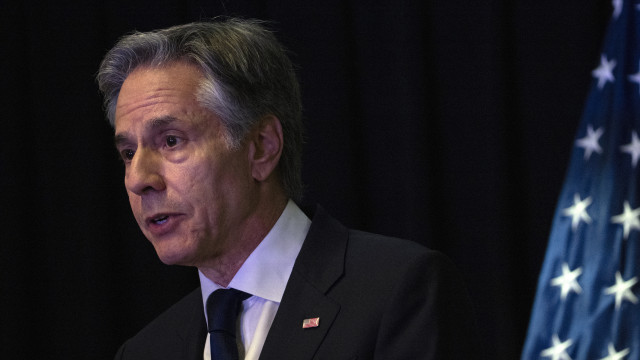US Secretary of State Anthony Blinken said he hoped Hamas would accept an "extremely generous" offer to halt the Israeli offensive in Gaza in exchange for the release of the hostages, AFP reported.
A meeting is to be held in Cairo between representatives of Egypt and Qatar, two of the mediating countries along with the US, and Hamas, which must give its response to this proposal agreed between Israel and Egypt after months of fruitless discussions.
Meanwhile, Anthony Blinken visited Saudi Arabia before travelling to Israel on April 30 as part of a new Middle East tour aimed at promoting a truce in the besieged Palestinian territory, which has fallen into a major humanitarian crisis.
The head of US diplomacy expressed hope that Hamas will accept the truce offer, which he described as "extremely generous on the part of Israel". "They have to make a decision and quickly. I hope they make the right decision," he added.
Anthony Blinken also reiterated his country's opposition to Israel's offensive against the overcrowded city of Rafah in the southern Gaza Strip, which has become a huge refugee camp housing almost one and a half million Palestinians in disastrous sanitary conditions.
According to doctors and the Civil Defense, Israeli strikes on several houses killed 22 people overnight in this city, which is bombed daily.
After braving the winter cold, displaced families are now exposed to the rising heat of late April, with no running water and little to no protection from the sun under the canvas of their tents.
"The water we drink is hot," said Ranin Awni al-Arian, the mother of a displaced family from the nearby town of Khan Younes.
"The children can no longer stand the heat, the flies and the mosquito bites," she explains. The baby in her arms has a face covered in bites and she struggles to find a "cure or solution" for her children.
Despite disapproval from many capitals and humanitarian organizations, Israeli Prime Minister Benjamin Netanyahu insists the Rafah offensive is necessary to free hostages held in Gaza since the war began on October 7 and defeat Hamas, which Israel says has regrouped four battalions in this town on the border with Egypt.
"We have not yet seen a plan that allows us to believe that civilians can be effectively protected," Blinken told a meeting of the World Economic Forum in Riyadh.
Egypt said it "believes" in reaching a new truce, saying the proposal presented "tries to show moderation".
"It is too early to talk about a positive atmosphere in the negotiations," said Zaher Jabarin, a member of the Hamas political bureau and the negotiating team.
"The movement has received the Israeli response and is in the consultation phase to respond to it," he added, reiterating the Islamist movement's demands, starting with a permanent cease-fire in the Gaza Strip, an option Israel has always refused to consider.
"The possibility of success or failure will be determined by the ability to solve a permanent cease-fire, (Israeli) withdrawal from the Gaza Strip, return of displaced persons, a clear timetable for starting reconstruction and an exchange agreement that removes any injustice to the Palestinian prisoners, both male and female," he said.
According to media reports, Israel's military cabinet initially called for the release of 40 hostages held in Gaza since the war began on October 7, before authorizing negotiators to reduce that number.
The US news website Axios reported that Israel was pushing for the release on humanitarian grounds of women, both civilians and soldiers and men over the age of 50 or in poor health.
According to Axios, Hamas claims that only 20 hostages meet these criteria. The site adds that the number of days of the truce will be equal to the number of freed hostages.
The war was sparked on October 7 when Hamas commandos infiltrated from Gaza and launched an unprecedented attack in southern Israel that killed 1,170 people, mostly civilians, according to Israeli figures.
More than 250 people were kidnapped and 129 remain captive in Gaza, 34 of whom have died, according to Israeli officials.
In response, Israel vowed to destroy Hamas, which has been in power in Gaza since 2007. According to the Hamas Health Ministry, which on April 29 counted 34 deaths in 24 hours, its offensive in Gaza has killed 34,488. people, most of them civilians.
Apart from Rafah, the bombing targeted the centre of the Gaza Strip and Gaza City in the north.
In Riyadh, Palestinian Authority President Mahmoud Abbas also called on Washington to prevent Israel from launching an offensive against Rafah. "America is the only country capable of preventing Israel from committing this crime," he said.
"If there is an agreement (on a ceasefire), we will suspend the operation in Rafah," Israeli Foreign Minister Israel Katz told Israel's N12 channel.
"If there is an opportunity to reach an agreement, we will do it," he added. /BGNES







